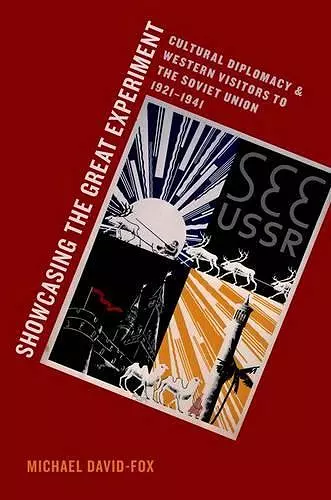Showcasing the Great Experiment
Cultural Diplomacy and Western Visitors to the Soviet Union, 1921-1941
Format:Paperback
Publisher:Oxford University Press Inc
Published:6th Mar '14
Currently unavailable, and unfortunately no date known when it will be back

During the 1920s and 1930s thousands of European and American writers, professionals, scientists, artists, and intellectuals made a pilgrimage to experience the "Soviet experiment" for themselves. Showcasing the Great Experiment explores the reception of these intellectuals and fellow-travelers and their cross-cultural and trans-ideological encounters in order to analyze Soviet attitudes towards the West. Many of the twentieth century's greatest writers and thinkers, including Theodore Dreiser, André Gide, Paul Robeson, and George Bernard Shaw, notoriously defended Stalin's USSR despite the unprecedented violence of its prewar decade. While many visitors were profoundly affected by their Soviet tours, so too was the Soviet system. The early experiences of building showcases and teaching outsiders to perceive the future-in-the-making constitute a neglected international part of the emergence of Stalinism at home. Michael David-Fox contends that each side critically examined the other, negotiating feelings of inferiority and superiority, admiration and enmity, emulation and rejection. By the time of the Great Purges, these tensions gave way to the dramatic triumph of xenophobia and isolationism; whereas in the twenties the new regime assumed it had much to learn from Western modernity, by the Stalinist thirties the Soviet order was declared superior in all respects. Drawing on the declassified archival records of the agencies charged with crafting the international image of communism, David-Fox shows how Soviet efforts to sell the Bolshevik experiment abroad through cultural diplomacy shaped and were, in turn, shaped by the ongoing project of defining the Soviet Union from within. These interwar Soviet methods of mobilizing the intelligentsia for the international ideological contest, he argues, directly paved the way for the cultural Cold War.
The books analytical framework and wealth of new material creates a rich canvas. ... the book provides an important historiographic and theoretical overview of the period, bringing together a wealth of information and revisiting questions of Soviet-Western intellectual exchange that still remain relevant today. * Ludmila Stern, European History Quarterly *
David Fox's marvellous book allows us to see things the way they really were. * Yvonne Howell, Times Higher Education *
David-Fox has produced a deeply researched and original book that invites readers to rethink or revisit some big historiographical questions: continuity and change across the dividing line of 1917, the nature and origins of Stalinism, and the connection between internal and external factors in national development. Of obvious interest to historians of modern Russia, this book will also be read with great benefit by scholars interested in cultural, political, and transnational history. * Robert H. Greene, The Historian *
ISBN: 9780199376421
Dimensions: 231mm x 157mm x 28mm
Weight: 658g
416 pages